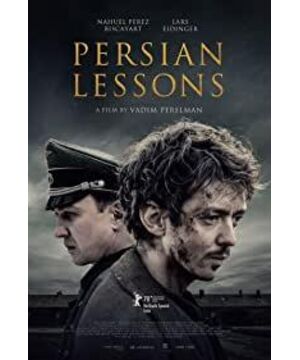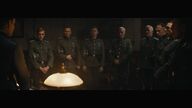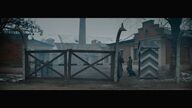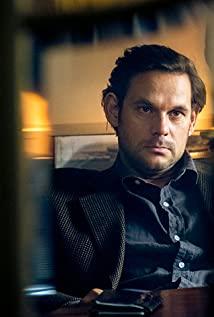No matter the subject matter of this film or the topic of discussion - lying to survive and being kind because of trust are enough to attract me to watch it, the Jewish people in the camp are faced with threats to their lives from corporals from time to time, which can be described as a step-by-step crisis. However, because the Jews are trusted by the captain, they get a kind of preferential treatment that is different from ordinary Jews (in the eyes of the Nazis, synonymous with stench and cunning), and it also makes him not too worried about food and life safety. In theory, as long as the lie can continue Continuing until the end of World War II, he will be able to escape smoothly. But if it has been smooth sailing, the narrative will be too bland.
In dealing with the external crisis from Corporal, the audience begins to expect a conflict that breaks the peace and harmony, so Corporal finds a real Persian and asks the real and fake Monkey King to confront, with the tense music playing, Our hearts were also raised, and this section can be said to be the climax of the movie.
But the director used the good-hearted people in the camp to kill the real Persians to resolve this crisis, so I was looking forward to whether there would be another wave of unrest, but unfortunately there was not!
The ending stops when the captain goes to Tehran and is arrested for exposing his identity for nonsense, and the Jews read the names of more than 2,000 Jews to the Allies. It seems that the political orientation is indeed correct, not leaning towards the Nazis.
But what I think about is if I let the captain know that the Jews are deceiving him in person, for example, when the two of them go to Tehran together and tell him that he has been lying, after all, the captain has been protecting him, giving him bread, canned meat, and coats, saving him many times. His life was only for him to teach himself Persian. From the poems written by the captain, it can be seen that he yearns for peace. He did not join the Nazi party because of lofty ideals. He has always wanted to open a restaurant to stay away from the war. In front of the Jew he trusted, the captain showed a real, kind and friendly side.
However, the Jews did not seem to repent of their actions from beginning to end, and an officer who had no heart to kill and pursued a life of seclusion did not wait for an apology.
Jew, your heart is so cruel! In the second half, the director wanted to highlight the aura of the Jews saving others and transferring the right to live to others. Since you are not afraid of death, why don't you dare to confess all this to the lieutenant?
The Jew walked to the church-like building, showing that he hoped for redemption in his heart, but cowardice made him hide it.
It is right for little people to weave lies in order to survive, but if the director explores the theme more grandly, for example, from the fear of death to finally being deceived, tormented and giving up life, highlighting the differences between Nazis and Jews in race, nationality, nationality, Wouldn't it be better if the camps were different but the trust they had in each other?
Humanity can continue forever, and the order has not collapsed. It is only because of the trust that comes from the depths of human nature. Marriage is concluded based on the trust between the two sexes; laws are promulgated based on the trust of violent institutions to maintain equality and justice; People to friends are also established because we believe that others approach us without malice, and are established based on the signals of goodwill released by both parties.
"Jiang Ziya" wanted to discuss "giving up one person to save the common people", but it messed up. "Persian Language Lesson" could have discussed "I stand on the opposite side of the world, but only release goodwill to you", but was avoided by the director, Probably this is the difference between China's unique heroic narrative perspective and collectivism and the common civilian perspective and individualism in the West. (Such as Once Upon a Time in America, The Pianist, The Popping Drummer, American Beauty, Requiem for a Dream, etc.)
View more about Persian Lessons reviews











